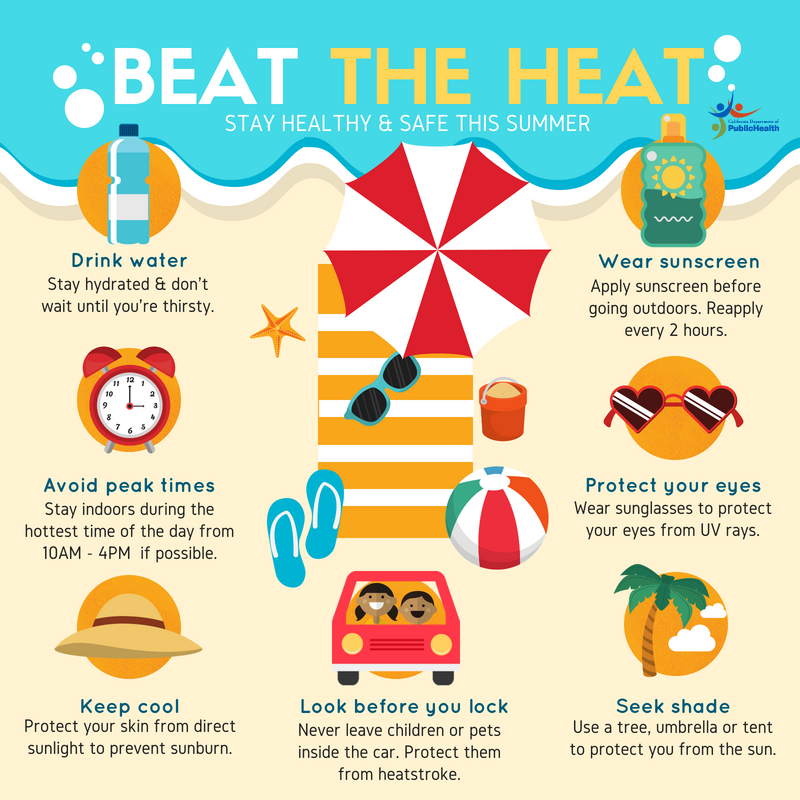| | | Summer ReadyPara ver esta pagina en Español haga clic aquí
Click here to view current events impacting Solano County
Click here to find a local COOLING CENTER
Summer Safety Tips to Beat the Heat 
Practice Heat Safety
- Go to a cool place like a cooling center, shopping center, or other air conditioned public place. Visit a neighbor, friend, or family member with air conditioning.
- Stay in the shade. Direct sunlight can speed up the effect heat has on your body.
- Wear sunscreen and sun glasses to protect your skin and eyes.
- Avoid outdoor activities during peak times, stay indoors during the hottest time of the day from 10am-4pm if possible.
- Stay hydrated even if you're not thirsty. Avoid drinks with caffeine or alcohol.
- Take a cool shower if you're feeling overheated.
- Limit physical activity and take breaks throughout the day.
- Wear light-colored and lightweight clothing
- Look before you lock, never leave children or pets inside your vehicle.
- Be a good neighbor, check-in with those most at risk, like the elderly, children, and pets.
People at High Risk - Seniors
- People with jobs that require physical exertion
- Infants and young children
- Animals and pets
- People with medical conditions like diabetes, respiratory problems, heart disease, obesity or alcoholism
Heat Related Illness
Heat cramps are muscular pains and spasms due to heavy exertion. Generally, loss of water and salt from heavy sweating can cause cramps.
Heat exhaustion occurs when body fluids are lost through heavy sweating.
Heat stroke can cause the body temperature to rise so high that brain damage and death can occur.
Call 9-1-1 immediately. | Signs of Heat Exhaustion | Signs of Heat Stroke (Call 9-1-1) | | Cool, moist, pale, flushed or red skin | Very high body temperature (over 105°F) | | Increased sweating, tiredness | Rapid pulse | | Headaches | Shallow breathing | | Fainting, nausea or vomiting | Hot, red, dry skin | | Fast, shallow breath, dizziness | Confusion | | Muscle cramps, weakness | Throbbing headache | | A weak, rapid pulse | Nausea | | | Failure to sweat | | | Unconsciousness | | | Seizures | Treating Heat Related Illness
Heat Cramps & Heat Exhaustion - Cool the person slowly. Get the person to a cooler place and have him or her rest in a comfortable position.
- Give fluids. If the person is fully awake and alert, give a half glass of cool water every 15 minutes. Do not let him or her drink too quickly. Do not give liquids with alcohol or caffeine in them.
- Loosen clothing. Remove or loosen tight clothing and apply cool, wet cloths such as towels. Call 9-1-1 or the local emergency number if the person appears in need of medical attention.
Heat Stroke - Call 9-1-1. Heat stroke is life-threatening and requires immediate emergency medical attention.
- Cool the person. Move the person to a cooler place. Wrap wet sheets around the person's body and fan it. If you have ice packs or cold packs, wrap them in a cloth and place them on each of the person's wrists and ankles, in the armpits and on the neck to cool the large blood vessels. Keep this process going until emergency medical help arrives.
Preparing for Power Outage
High heat events sometimes lead to power outages (rolling blackouts, brownouts, etc.). Visit the resource links below to see how you can prepare. Flex Alerts
What is a Flex Alert?
A flex alert is a call to voluntarily conserve electricity when there is an anticipated shortage of energy supply.
What can I do?
Morning Before a Flex Alert - Pre-cool your home by lowering your thermostat to 72°
- Close the blinds and drapes to keep the sun from heating up the home.
- Turn off unnecessary lights
- Use dishwashers, washing machines, and other major appliances.
- Set pool pumps to run early in the morning.
- Charge mobile devices and laptops.
- Charge electric vehicles
During a Flex Alert - Set the thermostat to 78° or higher, if health permits.
- Avoid using dishwashers, washing machines, dryers, and ovens.
- Turn off unnecessary lights. Unplug or turn off electrical devices that you are not using.
- Keep blinds and drapes closed to prevent the sun from heating up the home.
- Use fans when possible.
How can I receive Flex Alerts?
Click here to sign up for flex alerts.
Get Notified
Click Here to sign-up for Alert Solano
Click Here to follow @SolanoOES on Facebook
Click Here to follow @SolanoOES on Twitter
Click Here to listen to 95.3 Live .jpg)
|
| | | |